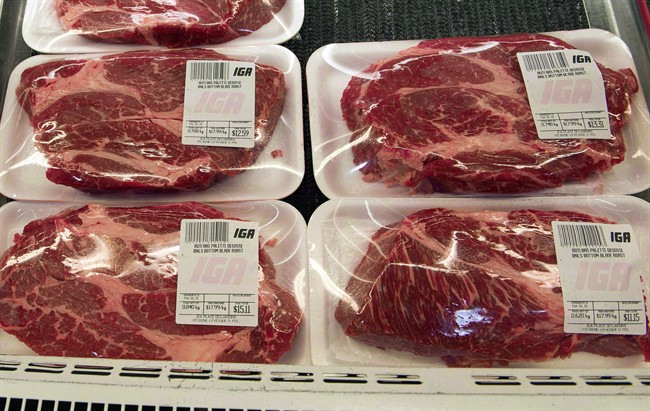Would a tax on meat convince you to put down a hamburger or stop eating steak?

PETA is calling for such a tax, claiming a meat-based diet is bad for the environment and hard on our health. But a spokesperson for the beef industry says there are benefits to a meat-based diet that the animal-advocacy group has ignored.
A professor at Dalhousie University adds that a “meat tax” would do its job and change some Canadians’ eating habits – but he questioned whether it would be the right move.
“It could actually compromise the security of many families when it comes to food,” said professor Sylvain Charlebois.
PETA points to the Academy of Nutrition and Dietetics (formerly the American Dietetics Association) in an effort to bolster its claim that “some of the biggest killers in North America” – including heart disease, cancer and stroke – can be prevented by removing meat from our diets.
That organization claims on its website that a vegetarian diet is associated with lower levels of obesity, reduced heart risk of heart disease and lower blood pressure.
LISTEN: Ashley Bryne explains why PETA is calling for a tax on meat
“People who eat even a moderate amount of meat actually face many health concerns that vegetarians and vegans have lower rates of,” PETA spokesperson Ashley Bryne said Thursday in a conversation with 770 CHQR’s Danielle Smith.
Evelyn Cheng, a registered dietitian, told 770 CHQR there is “a ton of evidence to support eating a more plant-based diet” but said we should stop “demonizing foods as unhealthy.”
The B.C. Cattlemen’s Association suggests the health risks from meat consumption are “very, very small.”
“If you really look at those numbers, they’re saying there’s a 17 per cent chance that you’re going to increase your risk,” B.C. Cattlemen’s Association general manager Kevin Boon said, citing a study by the World Health Organization’s International Agency for Research on Cancer (IARC). “It’s not saying that your risk increased – it’s saying there’s a 17 per cent chance that it could increase.”

Get weekly health news
The IARC study found the risk of colorectal cancer could increase by 17 per cent for every 100-gram portion of processed red meat eaten daily.
“Meat itself is getting blamed for something that additives are adding to it,” Boon further suggested, pointing to the fact that the research covered only the consumption of processed meat.
Boon added that there are health benefits for those consuming meat, such as the high level of iron in red meat.
“I think that one serving of beef has the equivalent in iron as a five-gallon pail of spinach.”
That’s not exactly true. According to Dietitians of Canada, there is between 2.0 and 3.4 mg of iron in ½ a cup of cooked spinach (1/2 pound of raw spinach) and between 1.4 and 3.3 mg in 2 ½ ounces of cooked beef.
That means there is roughly the same amount of iron in a 1 1/2 cup of cooked spinach as there is in an eight-ounce steak.
It should be noted that plant-based foods contain non-heme iron, which isn’t as easily absorbed into the body.
“But absorption can be increased by eating iron-rich foods with Vitamin C-containing foods – such as citrus fruits – and limiting calcium-rich foods – such as dairy – as calcium competes with iron for absorption,” Cheng said.
Cheng added that spinach contains oxalic acid, which binds naturally with minerals and makes them more difficult to absorb. Cooking it can break down the oxalic acid, making it easier for your body to absorb the iron.
LISTEN: BC Cattlemen’s Association responds to PETA’s call for a meat tax
“I find it hard to believe that we can consider it a sin to eat,” Boon added. “You know, if we talk about health aspects…. we don’t proclaim or say that everybody should have a total meat diet – it’s all in balance.”
Charlebois told 770 CHQR that a tax on meat would likely discourage a lot of Canadian consumers from eating meat because of the “strong correlation between price points and consumer demand.
“Any time beef prices go up, you actually do see demand drop as a result,” he said.
However, Boon suggested the health and environment risks posed by meat are grossly exaggerated and that, when it comes to the environment, there are actually benefits to meat production that are rarely mentioned.
Boon said that ranchers and farmers are stewards of the land and are able to create and maintain thriving ecosystems, where animals and plants flourish.
WATCH BELOW: Meatless recipes that are healthy and tasty

He suggested that the grasslands used to feed cattle and other livestock also have benefits for the environment.
One study by the Government of Alberta found that converting marginal cropland to well-managed rangelands is “the most promising method of increasing carbon storage.”
But PETA, which advocates for the ethical treatment of animals, maintains that meat production is one of the main contributors to the world’s most serious environmental problems.
“We’re not just talking about global warming,” Bryne said. “We’re talking about contamination of soil and water, we’re talking about water usage – just waste in general.”
The contamination of water and water usage is a problem that Boon thinks ranchers are helping to fix.
“We’ve got roughly 1,500 dams and reservoirs here in B.C. – 900 of them have been built, are maintained and are managed by the ranching community,” Boon explained to 770 CHQR. “And this water is not just for agriculture, it’s for recreation, for fish, for water management and for towns and cities.”
PETA said there are different ways a tax on meat could be implemented, but said in the past, they’ve argued in the U.S. for a 10 per cent tax for one pound of meat. They said, ultimately, it’s up to the government in Canada to decide how it wants to proceed.






Comments